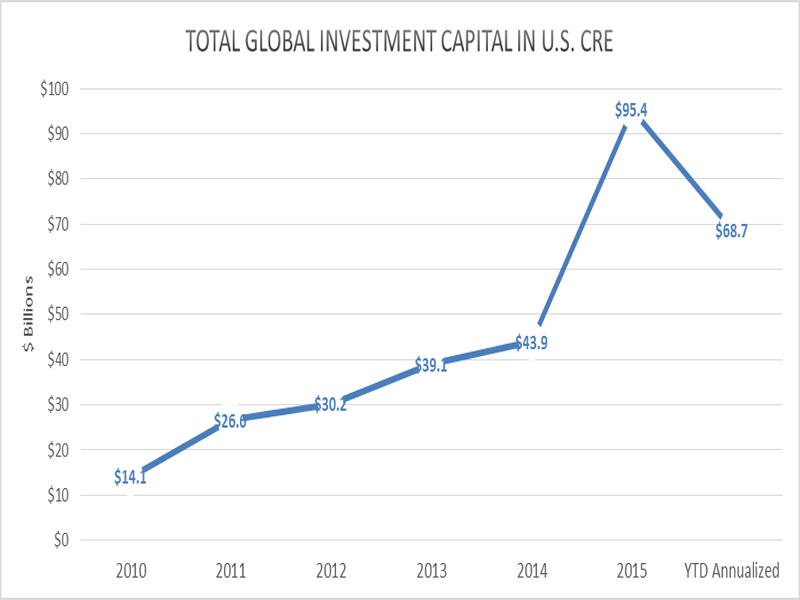The Effects of Brexit on U.S. CRE
In the wake of Great Britain's decision to leave the European Union, Jilliene Helman of RealtyMogul.com examines potential impacts on the U.S. commercial real estate industry.
 By Jilliene Helman, CEO & Co-Founder, RealtyMogul.com
By Jilliene Helman, CEO & Co-Founder, RealtyMogul.com
In a historic event, Great Britain voted to leave the European Union. The so-called “Brexit” decision was largely unexpected by the markets and has triggered a wave of global political and economic uncertainty. Let’s examine the potential effects on the U.S. commercial real estate market, and how the Brexit could impact your property portfolio.
Stock Market Volatility: How Does Real Estate Impact a Roller Coaster Ride?
The day following the vote, the CBOE Volatility Index, also known as the VIX and commonly referred to as a gauge of investor fear in the market, increased by as much as 67 percent. The pound fell almost 13% from a 2016 high of $1.501 against the dollar on Thursday to new lows of $1.312 on Monday, the lowest level since 1985. Furthermore, Standard & Poor’s and Fitch on Monday downgraded the United Kingdom’s credit rating from AAA and AA-plus, respectively, to AA, citing Brexit as the primary reason for the downgrades. The S&P 500 fell as much as 5 percent over the next two trading days, marking the worst two-day period for U.S. stocks since August 2015. Markets generally do not react well to uncertainty, and there are numerous open questions as to how Brexit will impact the British, American and global economy going forward. If you hold private real estate in your portfolio, however, you may be shielded from the short-term fluctuations of the market and could potentially stand to benefit from Brexit. Here’s why:
When professional investors add private real estate to a portfolio, they are generally attempting to (1) diversify their holdings, (2) minimize the volatility of that portfolio and (3) maintain or increase the portfolio’s level of return. While the VIX may remain elevated in the near term, private commercial real estate valuations are not derived from the daily fluctuations of the stock market. Certainly, there are different levels of risks in real estate investments, but properties that are well occupied and have stable income streams offer investors less volatility per unit of return and can help “smooth” portfolios that are heavily exposed to the public markets.
Wherever Interest Rates Go, We See Potential Positives for CRE Investors
Immediately following the release of the initial voting results, investors flocked to the relative safety of government bonds. The German 10-year bund slipped into negative territory for the second time in one week. The U.S. 10-year Treasury reached lows not seen since 2012. Long-term bond yields typically go down as demand for the safe investments increases.
What this means for U.S. interest rates is unclear. The Federal Open Market Committee, which sets the federal interest rate, stated that concern for Brexit influenced its decision to hold rates steady in June. Now that Brexit is a reality, Reuters reports that “traders of U.S. interest-rate futures … now see little chance of any rate hike until the end of next year.”
However, it is important to note that the FOMC considers numerous economic variables when making a decision on interest rates, and it is prudent to understand that regardless of the number of rate hikes in 2016, the outcomes have potentially positive implications for commercial real estate investors. If the FOMC chooses to raise rates, that will signify confidence in the overall economy—a positive factor for commercial real estate. If there is no rate hike by the end of the year, the low interest-rate environment that has supported cheap financing of commercial real estate assets will persist—another positive factor for CRE. In short, there are potential positive implications in either potential outcome.
U.S. Real Estate Still a Safe Harbor
The EU accounts for a significant amount of foreign investment in U.S. commercial real estate. Per Real Capital Analytics’ Cross-Border Capital Tracker:
- The EU collectively invested more than $13 billion into U.S. CRE in 2015. Of that, the United Kingdom contributed approximately $2.72 billion.
- China, by comparison, invested approximately $5.98 billion.
Despite potential economic repercussions to both the U.K. and the EU stemming from Brexit, it may prove to be a positive economic event for U.S. commercial real estate. This is due to a phenomenon covered in a previous RealtyMogul.com post: It’s U.S. Against the World: A Global Perspective on Domestic Commercial Real Estate. That phenomenon is the fact that the United States has become a safe harbor for global investment capital. This is highlighted by the following data points from Real Capital Analytics Inc.:
- Total global investment in U.S. CRE grew to $94.1 billion in 2015.
- That accounts for a 576 percent increase from the $14.1 billion invested in 2010, when adjusted for inflation.
- Annualized investment capital year-to-date, as of June 2016, is projected to be $67.7 billion.
 Prior to the referendum vote, Britons flocked to convert their pounds into USD and euros. Due to Brexit, everyday Britons saw 13 percent of their purchasing power vanish at one point. This loss of purchasing power is the very same concept that has fueled the recent influx of foreign capital into U.S. commercial real estate. As investors from the U.K. and the greater EU brace for potential market volatility in the coming months, we could see a further increase of foreign investment capital into U.S. commercial real estate. This could have a positive impact on commercial real estate asset pricing domestically.
Prior to the referendum vote, Britons flocked to convert their pounds into USD and euros. Due to Brexit, everyday Britons saw 13 percent of their purchasing power vanish at one point. This loss of purchasing power is the very same concept that has fueled the recent influx of foreign capital into U.S. commercial real estate. As investors from the U.K. and the greater EU brace for potential market volatility in the coming months, we could see a further increase of foreign investment capital into U.S. commercial real estate. This could have a positive impact on commercial real estate asset pricing domestically.
Conclusion
While Brexit is indeed a momentous change that will mark a major point in history, it may temporarily boost domestic commercial real estate markets and create opportunities for prudent investors. The coming weeks and months may be uncertain, but commercial real estate may offer shelter from the storm. As with all investments, investors should evaluate each individual real estate opportunity to see which best fits his or her investment strategy.







You must be logged in to post a comment.